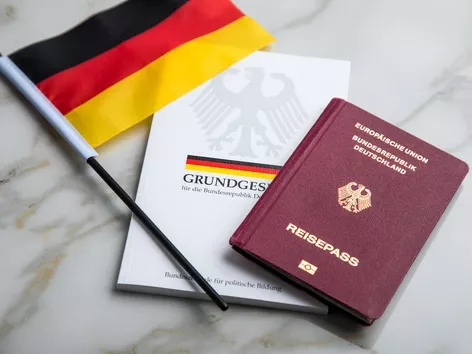Buying Real Estate in Germany in 2025: A Guide for Expats

Germany is the most economically developed country in the EU and boasts a stable real estate market. At the same time, only 40% of Germans own their own homes. Although mortgages are quite affordable in the country, long-term rental property prevails here. Learn more about the procedure of buying real estate in Germany for expats, the cost and peculiarities of the legal framework
Germany is the most economically developed country in the EU and boasts a stable real estate market. At the same time, only about 40% of Germans own their homes — long-term rentals remain the norm. Although mortgages are accessible, the legal and financial procedures for buying property may seem complex to expats. Here’s an up-to-date guide on how to buy real estate in Germany in 2025, including legal requirements, financing, and typical costs.
Choose a reliable health insurance policy on the Visit World portal to protect yourself from unforeseen expenses during your move. Support from a trusted insurance agent with a guaranteed payout in just a couple of clicks!
Why Buy Property in Germany?
Germany offers a high standard of living, excellent healthcare, and a robust economy — all attractive features for those considering relocation. Expats can buy property freely, and homeownership may complement broader immigration plans. However, purchasing real estate in Germany does not automatically entitle the buyer to a residence permit. If you are seeking long-term residence, the property must be part of a larger investment or personal relocation strategy.
Step-by-Step Guide to Buying Property
- Budget Planning
Calculate your total budget, including purchase price, taxes, and administrative fees. Most banks require a down payment of 20–40%, especially for non-residents. It’s advisable to consult a bank or mortgage broker in advance.
- Property Search
Use online portals or real estate agencies to find suitable listings. Schedule multiple viewings to understand the local market and pricing trends.
- Reservation & Deposit
Once you choose a property, you may place a reservation and pay a deposit (usually 1–2% of the price) to take it off the market. This is often done through a notary trust account for security.
- Legal & Notarial Process
In Germany, real estate transactions must be handled by a licensed notary. The notary prepares the purchase agreement, oversees its signing, and ensures proper registration in the Land Register (Grundbuch).
- Financing (if applicable)
Expats may apply for a mortgage with proof of income, a solid credit rating, and a German or EU residence. In 2025, many banks require residence in Germany to approve a mortgage. Leading providers include DKB and Santander, though non-residents may face stricter conditions.
- Transfer of Ownership
After the agreement is signed and taxes are paid, the property is officially registered in your name. The full process may take several weeks to complete.
Legal Considerations real estate in Germany
- Property can be bought by one or more individuals (joint ownership is allowed, no family ties required).
- Spousal consent is not generally required, though it may be requested in specific federal states.
- Every property must be registered in the Land Register, which holds information about past ownership, debts, structural components (garage, land plot), and legal encumbrances.
- Only licensed public notaries can complete the legal process of property transfer in Germany. Their role is to ensure fairness and legal compliance.
What is needed to buy real estate in Germany?
To buy a house in Germany, you need to perform the following steps:
1. Reserve the selected property.
2. Prepare a draft purchase and sale agreement.
3. Sign the agreement.
4. Open a trust account and make a payment.
Mortgage Rules for Expats in 2025 in Germany
Most German banks offer mortgages only to individuals with residence in Germany or the EU.
Standard down payment: 20–40% of the purchase price for non-residents.
Mortgage terms range from 10 to 30 years, with fixed interest rates typically locked for 10 years in 2025 due to recent inflation control measures.
Online mortgage calculators are available, but personal meetings or video verification are usually required before approval.
Mortgage interest may be partially tax-deductible, but capital gains tax (25%) still applies if you sell within 10 years of purchase.
Costs Involved in Buying Real Estate
Total purchase-related costs average around 10–12% of the property price, including:
1. Grunderwerbsteuer (property transfer tax) – 3.5% to 6.5%, depending on the federal state:
- 3.5%: Bavaria, Saxony
- 4.5%: Hamburg
- 5%: Hesse, Brandenburg, NRW, Rhineland-Palatinate, others
- 6%: Berlin
- 6.5%: Schleswig-Holstein, Thuringia
2. Notary fees – approx. 1.5%
3. Registration fees – approx. 1%
4. Real estate agent’s commission – shared between buyer and seller since 2021: Usually 3–6% in total (1.5–3% per party) + 19% VAT.
New Considerations in 2025
- Energy efficiency certificates are mandatory for all property listings and sales. Be sure to review the building’s Energieausweis before buying.
- In coastal or flood-prone areas, banks may now assess ESG and climate risks before approving loans.
- The real estate market in 2025 has stabilized. After a slight price correction in 2023–2024, prices in small towns have decreased slightly, while large cities such as Berlin and Munich have seen modest growth (1–3%).
Buying property in Germany in 2025 remains a smart investment, especially with careful financial planning and professional legal support. While the process can be complex, working with a certified real estate agent, notary, and (if needed) a mortgage consultant will make your purchase safer and more efficient. For those planning a long-term stay in Germany, property ownership offers not just comfort but potential integration into German society and its stable economy.
German real estate legislation is one of the most detailed in Europe. It guarantees the security of transactions, but also requires impeccable compliance with all legal procedures. That is why legal support for the transaction is not a formality, but the key to a safe purchase.
Need expert advice? Contact trusted lawyers who will help you invest safely in German real estate.
Reminder! Foreign drivers in Germany are also required to comply with local traffic rules. We have already told you what fines violators face in 2025.
Products from Visit World for a comfortable trip:
Checklist for obtaining a visa and necessary documents in Germany;
Legal advice on business issues in Germany;
Travel insurance for foreigners in Germany;
Medical insurance around the world.
We monitor the accuracy and relevance of our information, so if you notice any errors or inconsistencies, please contact our hotline.
Frequantly
asked questions
Can a foreigner without a residence permit buy real estate in Germany?
Does buying real estate in Germany entitle you to a residence permit?
What tax do you have to pay when buying a house?
Recommended articles
2 min
Travels
Travel to Germany in 2025: Entry Rules, Visa Processing & Top Tourist Attractions
Planning a trip to Germany in 2025? Learn about current entry regulations, visa types, top tourist destinations, useful travel tips, and important safety tips. This guide will help you prepare for your trip and make it as comfortable and safe as possible
01 Jun. 2025
More details1 min
Residence permit
Obtaining a temporary residence permit in Germany is an important step towards legally staying, working or studying in the country. Find out what types of permits are available, the step-by-step application process, what documents are required and other important details.
22 May. 2025
More details2 min
Expats
Medicine in Germany for foreigners 2025: insurance features and medical tourism
The German healthcare system is extensive and provides support to everyone who needs it. Find out more about whether foreigners need to take out health insurance in Germany, for whom it is mandatory, and how to obtain a medical visa
28 May. 2025
More details1 min
Popular
In 2025, Germany tightened immigration rules: it banned family reunification for individual refugees, revoked citizenship for 3 years, and approved new border restrictions. Find out what has changed, who will be affected by the changes, and how foreigners can act this summer
03 Jun. 2025
More detailsAll materials and articles are owned by VisitWorld.Today and are protected by international intellectual property regulations. When using materials, approval from VisitWorld.Today is required.
